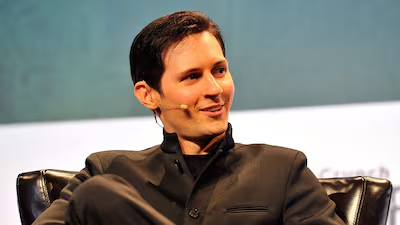The woes of Telegram founder Pavel Durov are likely to mark a watershed for when positive sentiment around the global technology sector peaked.
It is not just about the messaging service company. The shockwaves of the actions by authorities in France against Mr Durov will probably herald a more circumspect attitude to what was assumed to be the unlimited potential of technology companies in general.
Clouds are hovering. Nvidia, a darling of investors, has seen the remarkable bull run on its share price stall, as the outlook for the chipmaker and AI’s potential impact lose some of the euphoria of the past year. Meanwhile, Apple is battling regulators in different regions, including the UK, forced to defend the dominant position it owes to the ubiquitous iPhone. These are just two illustrations of what has become a trend.
Telegram’s own run-ins with governments are nothing new, but the detention of its chief is unprecedented in the story of how global technology companies emerged to dominate 21st-century life. There should be a wariness among analysts, investors, employees and users about what could come next for the sector in terms of government regulation.
We are now well beyond the theatre of US congressional hearings, with Meta’s Mark Zuckerberg, in particular, under greater scrutiny, but which resulted in little tangible consequences for how they operate.
Another person in the spotlight – but one who arguably seeks out confrontation – is Elon Musk. Having turned what was Twitter, the world’s “town square”, into X, his own personal megaphone, he has frequently flirted with the line between confidence and arrogance. Yet like Mr Zuckerberg, he has not yet been subject to any serious government intervention.

Mr Durov is, however, a bit of a contradiction in comparison to his peers. He comes across as old Hollywood, with the physique and mystique of a 1950s movie star while espousing the neo-geek chic of the messianic Neo character in The Matrix movie franchise. His own attitude to family life, as well as the remote fathering of many children as a sperm donor, evokes more a Howard Hughes vibe than that of a Patagonia-wearing Silicon Valley tech bro.
Still, cult of personality has always been a part of success in tech, for good and ill, and so it is not surprising that people associate these platforms with the men (and it is usually men) running them. Blame for failures should fall on them, too, then. Yet none of the above, other than Mr Durov, have ever been charged with any crime despite the catalogue of problems and issues caused by actions taken by users on their sites over many years.
That’s despite content moderation, in particular, remaining a flash point between technology companies and authorities, and one that has afflicted almost every site.
The journey goes a little something like this: at first, there is little concern beyond the content being needed to bring the users. So, the content drives advertising revenue. So far, so good. But the content also represents danger to the integrity of institutions and elections, and to people – most importantly children. Ultimately, when things go too far, there will be a wringing of hands. Some money will be thrown at the problem, but it will never go away because it is intrinsic to the business model of these platforms.
Muddying the waters, there is often – and in Telegram’s case, too – a distraction in the form of debates about how clamping down on content affects free speech and human rights. Yes, these issues are important, but they make us forget too quickly that these large companies are businesses with the power of governments. When Mr Musk and others promote rhetoric about free speech, it is better to watch what they do, rather than what they say. Profit is always the most important factor and that will undermine anything else.
Over the past decade, the situation has improved though, and online content has lost some of its early Wild West atmosphere in favour of a kind of semi-autonomous chaos theory. Some resources have been directed at controlling the quality and veracity of what is seen by users. It is an uphill battle. The scale of the task and, by implication, its potential stymying of platform growth has led to the results being less than satisfying for all parties.

For example, Meta has admitted having taken content down at the request of the US government, and Mr Zuckerberg recently expressed regret over some of these decisions. Globally, regulators, law enforcement agencies and authorities might argue that tech industry co-operation is, at best, patchy.
With the advent of the era of Generative AI, the technology could push us in two very different directions. First, the borders of what information AI can, and should, have access to are already porous. In addition, while AI would, in theory, allow the filtering and censoring of almost any content we choose, to be done quickly and automatically, this would certainly have implications for free speech. Equally, because individuals have such powerful AI capabilities at their fingertips, creating their own content in seconds could easily return us to a Wild West where anything goes.
As we navigate the way forward, the executives controlling the platforms will have to tread very carefully about how they use their influence and positions. No matter how big they might seem now as personalities, they should not be complacent about their own positions.
Even Jack Ma fell from grace. He was once an inspiration for a whole generation of ambitious young Chinese would-be entrepreneurs. Now he is a cautionary tale about the limits of power, for anyone seeking to follow in the footsteps of Alibaba’s co-founder.
Should Mr Durov’s experience prove to be an isolated case and not a sign of things to come, then we would have at least learnt that it is safer to build a global technology platform if you are American.



